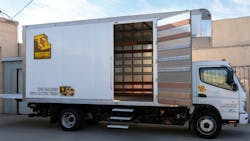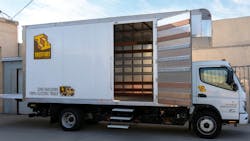Trucking Efficiency Roundup: Sustainability efforts from Rizon, DHL, ATRI
Key takeaways:
- Rizon Truck is increasing its California presence by delivering all-electric e18L trucks to various sectors, showcasing the rise of zero-emission transportation across industries.
- DHL Supply Chain has teamed up with Fortum Battery Recycling to improve the logistics of recycling electric vehicle batteries, supporting a circular economy for EV resources.
- The American Transportation Research Institute has released updated compendiums on sustainability and idling regulations to help trucking companies implement eco-friendly practices and comply with regulations.
Rizon Truck expands California footprint with new deliveries
All-electric Rizon Truck, a Daimler Truck brand, continues to scale its California presence with new vehicle deliveries to both municipal and commercial customers.
Treefort Entertainment, a specialty equipment rental company serving the film and television industry, added a Rizon e18L electric box truck to its fleet, where it is used to deliver camera support and rigging equipment to productions across Los Angeles.
LA Percussion, a musical instrument rental company, added a Rizon e18L electric box truck to provide quieter, zero-emission deliveries to its customers.
South Bay Fabrication, a precision sheet metal and fabrication specialist in Huntington Beach, added a Rizon all-electric truck to its fleet, supporting its goals for innovation and low-impact operations.
California’s public sector is also embracing electrification, with local agencies adding Rizon e18L trucks to their operations.
In the Central Valley, one municipality is using a Rizon truck upfitted with a dump-body to support wellness services, while a Sacramento-area utility has adopted a box-body model aligned with supporting its 2030 carbon neutrality goal.
A Southern California school district recently added two refrigerated Rizon trucks to meet rising demand for zero-emission fleet capabilities.
“It’s exciting to see more organizations across sectors embracing zero-emission transportation,” Andreas Deuschle, global head of Rizon Truck, said. “Whether supporting municipal services or creative industries, Rizon trucks are proving their value in real-world operations. This wave of adoption underscores growing confidence in the capability, reliability, and environmental benefits of electric commercial vehicles.”
DHL Supply Chain partners with Fortum Battery Recycling for sustainable battery recycling
DHL Supply Chain recently signed a long-term contract with Fortum Battery Recycling, a business of the Nordic energy company Fortum. The agreement covers the development and provision of customized service logistics solutions for the recycling of electric vehicle batteries.
Fortum Battery Recycling provides a European solution for every stage of the battery recycling value chain. The company develops processes to recover raw materials such as lithium, cobalt, and nickel from used batteries with minimal waste residue. Under the agreement, DHL Supply Chain will provide customized service logistics solutions to ensure that Fortum's recycling processes run smoothly, safely, and efficiently.
“Our collaboration with Fortum underscores our commitment to providing innovative logistics solutions to meet the growing demands of e-mobility,” Hendrik Venter, CEO at DHL Supply Chain EMEA, said. “Through our expertise in service logistics and our global network, we can help Fortum expand its recycling capabilities while maintaining the highest safety and sustainability standards.”
For Fortum, the cooperation with DHL Supply Chain is an important step in further expanding its sustainable recycling solutions and making the market for electric vehicles even more environmentally friendly.
“We are proud to be working with DHL Supply Chain to develop an efficient and sustainable logistics solution for the recycling of EV batteries,” Anssi Airas, head of business line battery at Fortum, said. “We believe that electrification of Europe is not possible without sustainable recycling of batteries taking place in Europe, for Europe. The cooperation with DHL is an essential building block for our mission to promote the circular economy and maximize resource conservation.”
ATRI updates two key environmental research resources
The American Transportation Research Institute recently released updated versions of its Sustainability and Idling Regulations Compendiums. The ATRI Sustainable Freight Practices Compendium launched in 2014 to serve as a one-stop shop for information on sustainable freight practices that motor carriers and drivers can implement. The compendium also identifies how public sector practices such as congestion mitigation, research and testing, and the use of incentives can advance sustainable freight goals. ATRI has now updated all three sections of its Sustainable Freight Practices Compendium—driver, vehicle, and public sector—with the latest research and data.
For 20 years, ATRI has provided an online compendium of the various idling regulations that limit how long commercial vehicles can idle. To help trucking companies and drivers comply with state and local idling regulations, ATRI continues to monitor the development of idling regulations across the country.
“ATRI’s Sustainable Freight Practices and Idling Regulations Compendiums continue to be among the most frequently accessed pages on the ATRI website, underscoring the industry’s commitment to proactively reducing its environmental footprint,” Rebecca Brewster, ATRI president, said.
About the Author

Jenna Hume
Digital Editor
Digital Editor Jenna Hume joined FleetOwner in November of 2023 and previously worked as a writer in the gaming industry. She has a bachelor of fine arts degree in creative writing from Truman State University and a master of fine arts degree in writing from Lindenwood University. She is currently based in Missouri.

